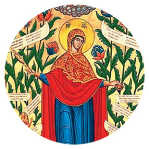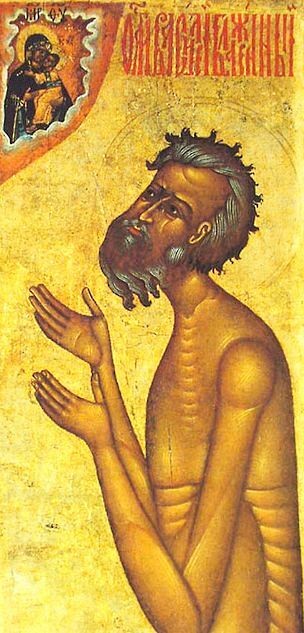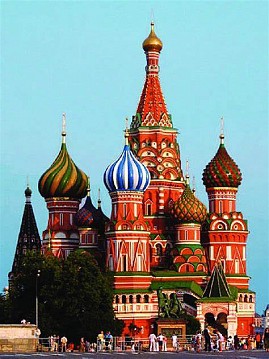Let no one deceive himself. If anyone among you seems to be wise in this age, let him become a fool that he may become wise. For the wisdom of this world is foolishness with God. For it is written, “He catches the wise in their own craftiness”. 1 Corinthians 3:18-19, New King James
One form of the ascetic Christian life is called foolishness for the sake of Christ. The fool-for-Christ set for himself the task of battling within himself the root of all sin, pride. In order to accomplish this he took on an unusual style of life, appearing as someone bereft of his mental faculties, thus bringing upon himself the ridicule of others. In addition he exposed the evil in the world through metaphorical and symbolic words and actions. He took this ascetic endeavor upon himself in order to humble himself and to also more effectively influence others, since most people respond to the usual ordinary sermon with indifference. The spiritual feat of foolishness for Christ was especially widespread in Russia. –(Excerpted from The Law of God, Holy Trinity Monastery, Jordanville, NY: 1993)
Saint Basil the Blessed, Wonderworker of Moscow, was born in December 1468 on the portico of the Elokhov church in honor of the Vladimir Icon of the Most Holy Theotokos outside Moscow. His parents were commoners and sent their son to be trained as a cobbler.
During Basil’s apprenticeship, the master happened to witness a remarkable occurrence, which showed him that his student was no ordinary man. A certain merchant had brought grain to Moscow on a barge and then went to order boots, specifying that they be made in a particular way, since he would not pick them up for a year. Blessed Basil wept and said, “I wish you would cancel the order, since you will never wear them.”
When the perplexed master questioned his apprentice he explained that the man would not wear the boots, for he would soon die. After several days the prediction came true.
When he was sixteen, the saint arrived in Moscow and began the difficult exploit of foolishness for Christ. In the burning summer heat and in the winter’s harsh frost, he walked about barefoot through the streets of Moscow. His actions were strange: here he would upset a stand with kalachi, and there he would spill a jug with kvas. Angry merchants throttled the blessed one, but he endured the beatings with joy and he thanked God for them. Then it was discovered that the kalachi were poorly cooked, and the kvas was badly prepared. The reputation of Saint Basil quickly grew, and people saw him as a holy fool, a man of God, and a denouncer of wrong.
A certain merchant wanted to build a stone church on Pokrovna in Moscow, but its arches collapsed three times. The merchant turned to the saint for advice, and he pointed him toward Kiev. “Find there John the Cripple,” he said. “He will advise you how to construct the church.”
Traveling to Kiev, the merchant sought out John, who sat in a poor hut and rocked an empty cradle. “Whom do you rock?” asked the merchant. “I weep for my beloved mother, who was made poor by my birth and upbringing.” Only then did the merchant remember his own mother, whom he had thrown out of the house. Then it became clear to him why he was not able to build the church. Returning to Moscow, he brought his mother home, begged her forgiveness, and built the church.
Preaching mercy, the blessed one helped those who were ashamed to ask for alms, but who were more in need of help than others. Once, he gave away a rich imperial present to a foreign merchant who was left without anything at all. Although the man had eaten nothing for three days, he was not able to beg for food, since he wore fine clothing.
The saint harshly condemned those who gave alms for selfish reasons, not out of compassion for the poor and destitute, but hoping for an easy way to attract God’s blessings upon their affairs. Once, the saint saw a devil in the guise of a beggar. He sat at the gates of the All-Pure Virgin’s church, and he gave speedy help in their affairs to everyone who gave alms. The saint exposed the wicked trick and drove the devil away.
For the salvation of his neighbor, Saint Basil also visited the taverns, where he tried to see a grain of goodness, even in people very much gone to ruin, and to strengthen and encourage them by kindness. Many observed that when the saint passed by a house in which they made merry and drank, he wept and clutched the corners of that house. They inquired of the fool what this meant, and he answered: “Angels stand in sorrow at the house and are distressed by the sins of the people, but I entreat them with tears to pray to the Lord for the conversion of sinners.”
Purified by great deeds and by the prayer of his soul, the saint was also given the gift of foreseeing the future. In 1547 he predicted the great fire of Moscow; through prayer he extinguished a fire at Novgorod; and once he reproached Tsar Ivan the Terrible, because during the divine services he was preoccupied with thoughts of building a palace on the Vorobiev hills.
Saint Basil died on August 2, 1557. Saint Macarius, Metropolitan of Moscow served the saint’s funeral with many clergy. His body was buried in the cemetery of Trinity church, where in 1554, the Protection cathedral was built in memory of the conquest of Kazan. His Holiness Patriarch Job glorified Saint Basil the Blessed at a Council on August 2, 1588.
In an early icon, Saint Basil is portrayed as old, with white hair curling at the ears, and a short, curly white beard. He is completely naked, and holds a handkerchief in his hand. The veneration of Saint Basil the Blessed was always so strong that the Trinity temple and the attached Protection church were renamed for him [the famous Saint Basil’s Cathedral in Moscow].
The saint’s chains are preserved at the Moscow Spiritual Academy.
Source: Orthodox Church in America Blessed Basil of Moscow the Fool-For-Christ – Orthodox Church in America (oca.org)




